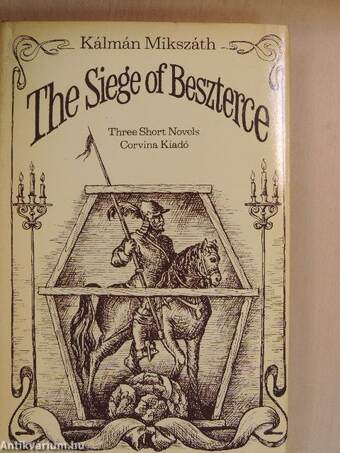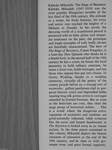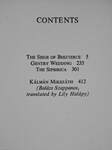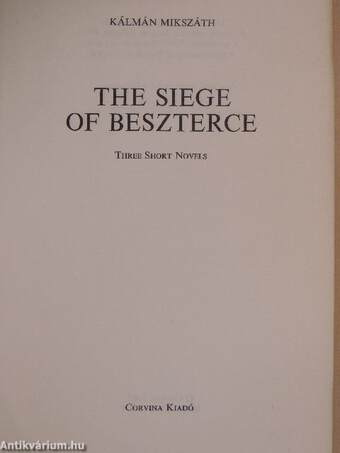1.067.327
kiadvánnyal nyújtjuk Magyarország legnagyobb antikvár könyv-kínálatát

VISSZA
A TETEJÉRE
JAVASLATOKÉszre-
vételek
The Siege of Beszterce
Three Short Novels
| Kiadó: | Corvina Kiadó |
|---|---|
| Kiadás helye: | Budapest |
| Kiadás éve: | |
| Kötés típusa: | Fűzött kemény papírkötés |
| Oldalszám: | 424 oldal |
| Sorozatcím: | |
| Kötetszám: | |
| Nyelv: | Angol |
| Méret: | 19 cm x 13 cm |
| ISBN: | 963-13-1306-9 |
| Megjegyzés: | Három mű egy kötetben. |
naponta értesítjük a beérkező friss
kiadványokról
naponta értesítjük a beérkező friss
kiadványokról
Fülszöveg
Kálmán Mikszáth: The Siege of Beszterce Kálmán Mikszáth (1847-1910) was the most popular Hungárián novelist of the last third of the 19th century. His attitűdé as a writer, his lively humour, his irony and satiric vein reached the heights of a Dickens or Daudet. In his novels the decaying world of a transitional period is presented wiht its falsé glitter and desperate insistance on the past; the grotesque and tragic examples of rolls badly chosen are forcefully characterized. The hero of The Siege of Beszterce, Count Pongrácz, is a later-day Don Quixote who thinks he is a feudal lord; in the second half of the 19th century he has a court, he forces the local peasantry to hold military exercises, he raises a local war, holds hostages, and has those who oppose him put into chains. In Gentry Wedding, thanks to a wedding ceremony, virtually all the gentry of the county parade before us, a strange sort of waxworks: gallant gentlemen elad in gorgeous historic attire and bejewelled ladies... TovábbFülszöveg
Kálmán Mikszáth: The Siege of Beszterce Kálmán Mikszáth (1847-1910) was the most popular Hungárián novelist of the last third of the 19th century. His attitűdé as a writer, his lively humour, his irony and satiric vein reached the heights of a Dickens or Daudet. In his novels the decaying world of a transitional period is presented wiht its falsé glitter and desperate insistance on the past; the grotesque and tragic examples of rolls badly chosen are forcefully characterized. The hero of The Siege of Beszterce, Count Pongrácz, is a later-day Don Quixote who thinks he is a feudal lord; in the second half of the 19th century he has a court, he forces the local peasantry to hold military exercises, he raises a local war, holds hostages, and has those who oppose him put into chains. In Gentry Wedding, thanks to a wedding ceremony, virtually all the gentry of the county parade before us, a strange sort of waxworks: gallant gentlemen elad in gorgeous historic attire and bejewelled ladies wearing long silk gowns arrive in carriages attended by liveried footmen. But as soon as the festivities are over, they shed the stagy pomp of borrowed richess . . . This is a world where the dangerous extravagancies of eccentrics and madmen are good-naturedly tolerated, while someone like the naive and honest headmaster in The Sipsirica is locked away in an insane asylum. In the three pieces contained in this volume, Mikszáth depicts the bizarre instances of alienation at the end of the 19th century, and he does so with grotesque irony and great formai ingenuity. VisszaMegvásárolható példányok
Nincs megvásárolható példány
A könyv összes megrendelhető példánya elfogyott. Ha kívánja, előjegyezheti a könyvet, és amint a könyv egy újabb példánya elérhető lesz, értesítjük.







